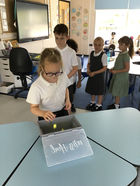PSHE & RSHE

Intent
At South Molton Community Primary School, Personal, Social and Health Education (PSHE) enables our children to become healthy, independent and responsible members of society. The intention of our PSHE curriculum is to deliver a curriculum which is accessible to all and will maximise the outcomes for every child so that they know more, remember more and understand more. As a result of this they will have the confidence to tackle many of the moral, social and cultural issues that are part of growing up.
Implementation
To ensure a consistent approach, with a shared language and understanding at its centre, we use the Jigsaw Programme. The scheme of work brings consistency and progression to our children’s learning, enabling children to understand and respect who they are, to empower them with a voice and to equip them for life and learning.
We teach Personal, Social, Health Education as a whole-school approach to underpin children’s development as people and because we believe that this also supports their learning capacity. We include the statutory Relationships and Health Education within our whole-school PSHE Programme.
Autumn 1 - Being Me in My World
(Includes understanding my own identity and how I fit well in the class, school and global community)
Autumn 2 - Celebrating Difference
(Includes anti-bullying and understanding)
Spring 1 - Dreams and Goals
(Includes goal-setting, aspirations, who do I want to become and what would I like to do for work and to contribute to society)
Spring 2 - Healthy Me
(Includes drugs and alcohol education, self-esteem and confidence as well as healthy lifestyle choices, sleep, nutrition, rest and exercise)
Summer 1 - Relationships
(Includes understanding friendship, family and other relationships, conflict resolution and communication skills, bereavement and loss)
Summer 2 - Changing Me
(Includes Relationships and Sex Education in the context of coping positively with change)
Impact
At South Molton Community Primary School we allocate time to PSHE each week in order to teach the PSHE knowledge and skills in a developmental and age-appropriate way. These explicit lessons are reinforced and enhanced in many ways: Whole school and class assemblies, themed weeks (such as Children’s Mental Health Week), the daily run, SEMH interventions, praise and reward system, school values and through relationships (child to child, adult to child and adult to adult) across the school. We aim to ‘live’ what is learnt and apply it to everyday situations in the school, local community and wider world.
British Values
Each half term we focus on one of the five British values. This half term we are looking at democracy. The children have voted for a variety of things since returning to school including the class eco councillor and the class novel.
Pupil Voice
“I like that we talk about our feelings, it gets the worries out of my head.”
“My favourite part is Calm Me time!”
“I’ve learnt how people can help us, like fire, ambulance and police people.”
“It’s so calm but also fun!”













